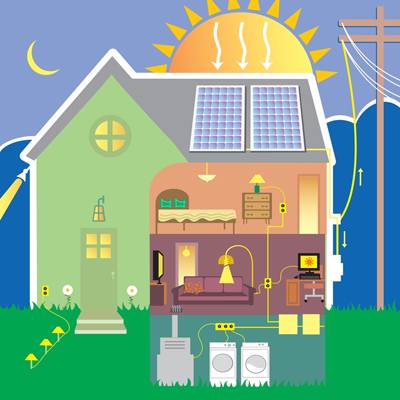
Do you want to know how much energy your home is losing and how much extra you’re paying in utility costs each year? Are you interested in reducing your carbon footprint and making your home as efficient and environmentally sounds as possible? If so, then it’s time to consider a home energy audit.
Home Energy Audit 101
A home energy audit identifies ways that your home is using and losing energy. It can help you save up to 30% of your home energy costs. Additionally, it can help identify problems within your home’s systems. You can then take steps to reduce energy losses and to improve the efficiency of your home.
When it comes to a home energy audit there are two basic choices to make at the outset. The first is whether you’re going to hire a professional to conduct the audit or whether you’re going to do it yourself. The difference depends largely on your budget and how much time you have to conduct an energy audit.
Establish a Foundation
Whether you hire a pro or do your home energy audit yourself the first step is the same. You want to determine how much you’re actually spending each month on energy. Gather your utility bills and crunch the numbers. Look for months that have heavy usage and months where your bills are relatively low. This may give you an indication about where to begin looking when you conduct your home energy audit.
Leaks, Lights and Losers
A home energy audit generally looks for the following pieces of information: Where your home is leaking. For example, are your windows well sealed or are you losing air around them? Lost air means lost heating or cooling. It causes your home’s systems to work harder to keep the temperature comfortable inside.
Insulation is another area where you may be leaking. Check attics, crawl spaces and external walls to make sure that your insulation is in good shape and is sufficient to protect your home.
Appliances tend to become less efficient as they age. Heating and cooling appliances, like your furnace, are often the biggest culprits for lost energy. If they’re more than 15 years old, take a consider replacing them with Energy Star systems and develop a maintenance routine that keeps them in tip top shape. You can also use a Kill-A-Watt Electric Usage Monitor to evaluate how much energy your appliances are using.
The lights in your home can consume a lot of energy. Replace bulbs with energy efficient LED lights or CFL lights and install dimmer switches where appropriate.
A professional home energy auditor will perform the same tests you perform. However, because they have the best technology readily available, they can have your home energy audit completed in a matter of minutes. They use thermographs to see where your home is losing heat and blowers to conduct leakage tests. The cost is usually around $200 and many utility companies offer recommendations and help cover some of the cost.
Whether you choose to conduct a home energy audit yourself or hire a professional, it’s a wonderful way to reduce your energy expenses, save energy, and reduce your carbon footprint. Call your local electric company for a list of professional auditors in your area or create a plan to audit your home this weekend.

